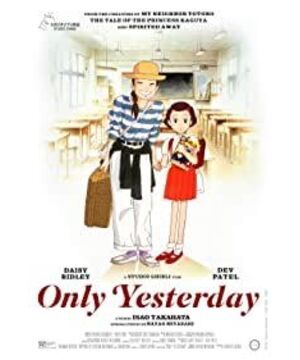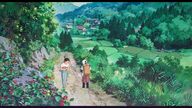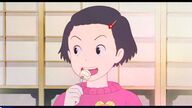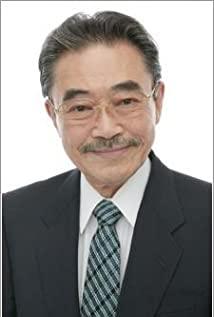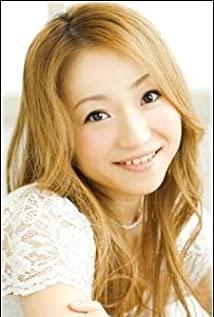I have always liked this kind of cartoon. It is actually a movie, but it is expressed in the way of animation. In my memory, domestic cartoons always seem to be naive and pedagogical and aimed at very young children, while American cartoons are very futuristic or too imaginative, and are generally aimed at specific groups of people or enthusiasts. And flat, realistic cartoons are only available in Japan.
To be fair, if you are watching this cartoon with the mentality of preparing to watch an ordinary animation work, I am afraid it will be difficult to keep watching it. There are no ups and downs, no exciting contradictions, just ordinary things about an ordinary Japanese woman living in an ordinary Japanese family. However, it is such a cartoon saturated with traditional Japanese flavor that I particularly like. The protagonist, Taeko Okashima, was tired of living in Tokyo and went to the countryside alone to participate in the labor of picking mountain flowers. Here, he met Ah Xiong, who devoted himself to "organic agriculture", and finally made up his mind to take root here. Such a simple story, but after interspersed with a few memories, it becomes rich and touching.
Taeko grew up with a typical traditional Japanese education, whether at home or at school, it's obvious. Everything in the family is obeyed by the male master - father, and the male dominance in the school is also obvious. In addition, the rules and hierarchies are very strict (there are regulations on how to eat a nutritious lunch, "a glass of milk saves a nation", so Japanese children are required to drink milk compulsory; for small children, a picket system must be established). In such an environment, her strongest feeling can only be repression - she will be ridiculed for eating pineapple, accused of being a "picky eater" if she refuses to eat something she doesn't like, her composition is well written and not taken seriously, and her acting attracts attention but is not With the support of the family, arithmetic can't be divided into fractions and it is said that the IQ is not good... Under such long-term psychological depression, it is not accidental that Taeko still has no favorite object at the age of 27. In fact, Taeko's image as a child was an extremely cute girl. The image after growing up is a little old-fashioned, especially the wrinkles on his face when he laughs. And the purity of the countryside made Taeko start her childhood memories on the train, which is by no means unrelated. Going to the countryside - passing away - memory, this is the core of the whole plot. Must get rid of the hustle and bustle of the city, people will think of their own roots, their own soul. The appearance of each character is not random, and has its deep psychological meaning. As Wang Anyi said: "There are no ordinary people in novels and movies, only deified people." The last sequence of scenes is simply too brilliant, Taeko was pulled by his classmates in elementary school, got off the return car, turned around and boarded the train back home, and threw himself into the embrace of the countryside without hesitation. With the touching ending song, it brought tears to my eyes.
View more about Only Yesterday reviews


